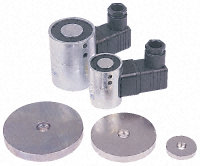Electro Magnet Drops For 'Wounds to the Face'
For those of you who saw or have been involved in Wounds to the Face you may know that the Placards which drop during the show were triggered by electro magnets. At the start of the production process we planned on using a device called a Solenoid. This device [Image 1 below] works by using an electro magnetic field to attract a pin into it. We planned on building a wooden housing for the solenoid so that when the pin was attracted into it a ring attached to the Placard would drop, therefore unravelling the material. However, the downwards force of the rolled placard on the Pin was too much weight for the solenoid to work.
So, back to the drawing board. There were originally 15 Placards but this was then cut down to 12. we experimented with still using the solenoids but building a new housing so that the weight would be relieved from the pin. This was not successful so we began looking at alternative methods. Steve phoned up The Citizens Theatre and managed to get 9 Power to de-energise dropping devises that they had made. Our budget did not allow us to buy the other 3 needed. However we did manage to buy 2 smaller magnets of the same type from RS Components [Image 2 below]. These pieces of equipment are extremley expensive [£93 for one magnet without cable plug or metal plate to attach too].
After receiving the items from RS I wired them up with a length of TRS and a 15 Amp plug. I then got Richard the Venue Technician to PAT Test the device. When plugged into the mains the magnet began to heat up and buzz when put into contact with metal. We phoned up RS who were of little help and ended up resorting to their online Data Sheet. It was here that we realised that unlike the Citizens magnets [which ran on 240v AC standard power] our 2 magnets would need to be run on a 24v DC supply. Several ideas for this were played with including the use of car batteries or car battery chargers.
The decision was made to spend the last of our budget on a 24v DC transformer from Maplin [£17.99] This would be able to power both magnets at the same time if required. Having purchased it I cut the connection end off and replaced it with a 10Amp connection [Female] and then constructed a 10Amp [Male] to 15Amp socket. This would allow the Magnets to be run via a length of 15Amp TRS from the prompt side fly floor onto the bar and down to the magnets position. All of this Passed its PAT test and worked well. We did have some concerns that the weight of the placards would not reach the required 0.38 Kg needed to release anything from the de-energised magnet.
Having finally got the electronics working I had to construct another housing for the new magnets. To cut down on design and trial time I copied the basic design of the drops we had borrowed from the Citz. [Image 3 below] I would have to construct my ones from wood instead of metal due to lack of workshop space and time restraints.
I came up with my rough sizings and threw together the case with the help of Chris in workshop. A large washer was used for the magnet to hold onto and release, a bolt used for the pivot point and another for the peg. A small ammount of re-alignment was needed on one of them but they were finished within one afternoon and flown by that evening. Finished article. [Image 4 below]
The 12th placard drop was made using a length of black sash and a Highwaymans Knot.
3 more of the Placards were cut from the show during the Technical Rehearsal, This included the one of each style of device used.



